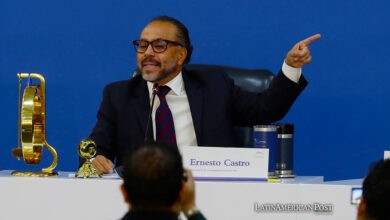Ritual Sacrifice in Mexican Senate Sparks Legal Controversy

A senator’s involvement in a ritualistic chicken sacrifice at the Mexican Senate building has ignited debates over indigenous customs versus animal welfare laws, highlighting deep cultural and legal tensions.
The Mexican Senate was thrust into the center of a controversial debate after Senator Adolfo Gómez of the ruling Movimiento Regeneración Nacional (Morena) party was reported to have promoted a ritual involving the sacrifice of a chicken within Senate premises. The act, captured in a video by journalist Leticia Robles and shared on social media platform X, shows a group conducting the ritual, which involved severing the chicken’s neck and collecting its blood in a jar.
Indigenous Ritual Sparks Controversy
The video was temporarily available on YouTube but was subsequently removed for violating the platform’s guidelines against depicting deliberate animal abuse and suffering. According to local Mexican media, the ceremony was reportedly part of “La Ofrenda por el Día de la Lluvia (Tláloc),” a ritual intended to invoke rain.
In defense, Senator Gómez, who identifies with an indigenous community, cited the second article of the Mexican Constitution, which recognizes the rights of native peoples and their traditional practices. In a statement to the newspaper 24 Horas, he expressed his familiarity with the law, particularly as a lawmaker. He questioned the media’s understanding of indigenous beliefs and urged journalists to revisit the history of Mexico’s indigenous communities.
However, the legal framework in Mexico City, where the Senate is located, prohibits explicitly using animals in rituals or traditions that compromise their welfare, as detailed in Article 25 of the city’s animal welfare legislation.
Backlash and Political Fallout
The incident has sparked significant backlash. Ana Lilia Rivera, also a member of Morena and the current president of the Senate, distanced the Senate’s leadership from the event and emphasized that Gómez had been explicitly denied permission to bring any animal into the Senate building. On her X profile, she reiterated the Senate’s commitment to animal rights and indicated that disciplinary actions would be considered against Senator Gómez.
The opposition has seized on the incident to criticize the current administration. Kenia López, a senator from the opposition party and chief of staff for opposition candidate Xóchitl Gálvez, linked the ritual to the broader policies of President Andrés Manuel López Obrador’s government, suggesting that it reflects a pattern of “death and destruction.”
Animal rights organization AnimaNaturalis announced plans to file a criminal complaint against Senator Gómez for animal cruelty with the Attorney General’s Office of Justice in Mexico City. This legal action underscores the ongoing conflict between respecting indigenous traditions and adhering to contemporary animal welfare standards.
The controversy highlights a complex intersection of Latin America’s cultural heritage, legal standards, and evolving social values. While indigenous practices form an integral part of Mexico’s cultural fabric, the implementation of modern laws concerning animal rights and welfare often clashes with these age-old traditions.
Navigating Tradition and Modernity
This incident in the Mexican Senate poignantly reminds us of the challenges Latin American societies face as they navigate the delicate balance between preserving traditional practices and enforcing modern legal frameworks. Debates like these unfold and reveal the broader societal shifts towards more humane treatment of animals while grappling with the preservation of cultural identity and heritage.
Also read: Mexico’s Amnesty Law Reform: Balancing Justice and Information
As the legal and cultural discussions continue, this incident’s implications will likely influence future legislative actions on animal rights and indigenous cultural practices in Mexico. This case raises questions about legal boundaries and artistic preservation. It reflects the ongoing global dialogue on how societies can honor their histories while embracing ethical practices that align with contemporary values.





